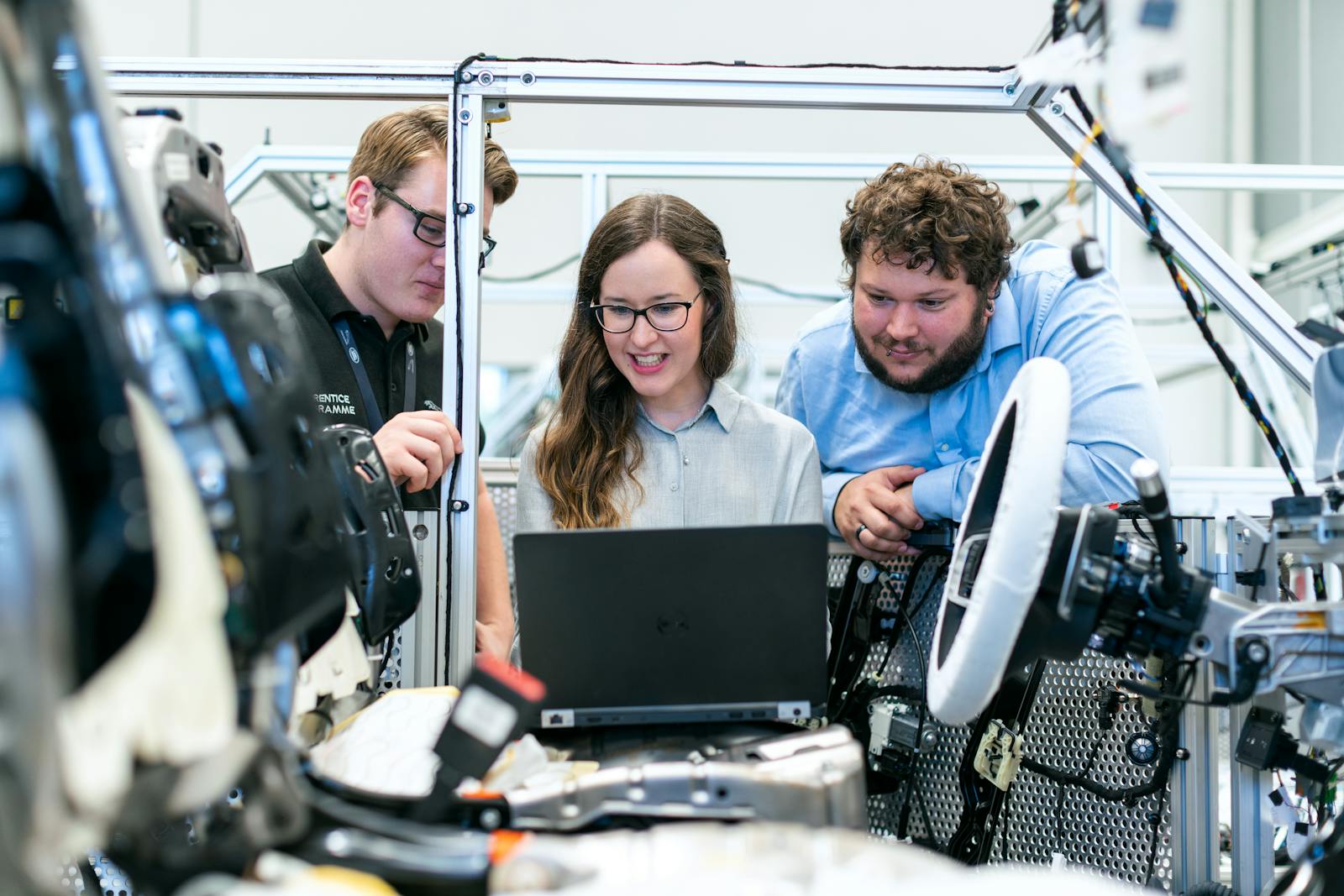Industrial automation is reshaping how factories and infrastructure operate in India. Two core technologies power this transformation: Programmable Logic Controllers (PLC) and Supervisory Control and Data Acquisition (SCADA) systems. For engineering students, learning PLC and SCADA offers a strong route into high-demand sectors. Access to certified training—especially free courses—can unlock jobs and career growth.
Why PLC and SCADA Training Matters for Indian Engineers

Photo by Sourabh
Automation now drives production across India’s factories, utilities, and transport networks. PLCs work as adaptable digital controllers, running everything from conveyor belts to power grids. SCADA software acts as the “eyes and ears” that monitors and controls these industrial processes, collecting data and enabling remote oversight.
Automating with PLCs and SCADA does more than boost output. It lowers costs, improves safety, and allows for predictive maintenance. Engineering students trained on these platforms can step immediately into roles needed by sectors hungry for automation skills. Building this technical foundation early helps set apart job seekers, making them more attractive to future employers.
Industrial Applications and Career Benefits
PLCs and SCADA touch nearly every industrial sector:
- Manufacturing: Robotics lines, packaging, process control
- Power and Energy: Substation automation, load management
- Water Treatment: Pump stations, real-time quality monitoring
- Oil & Gas: Pipeline controls, refinery automations
- Building Management: Smart elevators, HVAC systems
With knowledge in PLC and SCADA, graduates can fill roles such as automation engineer, control systems engineer, maintenance technician, and project manager. Entry-level salaries can range from ₹2.5 to ₹5 lakh per year, rising quickly with experience and advanced skills.
Many companies in India, from large manufacturers to infrastructure service providers, now list PLC and SCADA skills as required for engineering positions. In fact, knowing these systems helps not just in getting a job but also in growing into supervisory and R&D roles.
Challenges Faced by Students: Cost and Access
Despite growing demand, students face major hurdles:
- Professional PLC/SCADA training courses can cost thousands of rupees.
- Practical, hands-on labs are often missing in basic online videos.
- Valid certificates are sometimes only available with paid upgrades.
- Not all institutes cover the latest industry standards or equipment.
This can leave many learners unprepared for the current job market. That’s why free, quality resources—especially those providing certification—are so valuable.
India’s Top Free PLC SCADA Training and Certificate Resources
Whether learning from home or looking for local, in-person practice, India now offers several respected free resources. Many combine online theory, video lectures, and sometimes simulation-based labs. Some also provide free certificates that add weight to a job application.
Government and Public Initiatives
Government-supported platforms bring trusted content and official certification. A few stand-outs include:
- NPTEL/SWAYAM: The National Programme on Technology Enhanced Learning (NPTEL) partners with top engineering institutes to deliver free courses on PLCs, industrial automation, and SCADA concepts. Learners can access comprehensive video modules, quizzes, and assignments. Certificate exams are available for a small fee, but the core learning is free.
- Skill India Missions: State and central skill councils sometimes run offline workshops with hands-on PLC hardware. Since schedules vary by state, it’s wise to check with your local Skill Development Center.
- NIELIT Calicut: The National Institute of Electronics & Information Technology regularly offers a free online Industrial Automation with PLC & SCADA course. The curriculum is designed to introduce engineering graduates to PLC programming, field-level instrumentation, and SCADA/HMI systems. Certificates are provided upon successful completion, helping learners show verified skills to employers.
Top Private and Industrial Free Training Platforms
Private and industry-backed platforms bring short, practical training sessions to the table:
- Automation Community: This portal runs free sessions on PLC basics, SCADA software, and industrial automation. Their Free PLC and SCADA Courses allow learners to sign up, study at their pace, and download certificates at no cost.
- LearnVern: Offering “Industrial Automation with SCADA” in Hindi, LearnVern gives a strong foundation in the concepts, especially for those preferring native-language instruction. While premium certificates are paid, all core learning and videos are free of charge.
- Open Online Courses: Platforms like Alison, Coursera, and edX have modules on PLC and SCADA, some of which can be audited for free. For example, by using the audit track, learners can unlock lessons, though a verified certificate may require payment. It’s possible to start building skills with free access, then pursue certification when ready.
In all these, picking reputable sources and looking for real user reviews helps spot the most effective programs. Some local institutes may offer free demo classes—these can be great for hands-on exposure even when short in duration.
To explore more structured and updated course options, resources like the Complete SCADA Course Guide provide a rundown of industry certifications and program formats currently available in India.
Tips to Maximize Learning and Build a Strong Resume
Getting the best from free PLC and SCADA education involves smart choices:
- Verify the Course Scope: Aim for courses that cover not only theory but also include practical examples and, if possible, simulation exercises.
- Combine Multiple Sources: Mix free online modules with in-person demos or workshops to balance practice and concepts.
- Use Free Software Simulators: Many PLC simulation tools are free. Practicing ladder logic and SCADA design virtually boosts your job readiness.
- Create an Online Portfolio: Document small projects or solutions you build. Use platforms like GitHub or LinkedIn to showcase work.
- Highlight Certification: Attach any earned digital badges or PDF certificates to your resume and online profiles.
- Stay Updated: The field of automation evolves. Follow industry news and upgrade skills regularly.
For students wanting to deepen their automation background even further, the Industrial Automation Courses Online guide can help with more advanced resources.
Conclusion
India’s industrial sector depends on engineers who understand PLC and SCADA systems. Free and credible training is a game-changer for students facing cost and access barriers. By using government portals, open classes, and private resources, you can add valuable certification to your learning journey. Keep practicing, update your skill set, and confidently show your knowledge to future employers—these steps will open doors to a rewarding engineering career.
Frequently Asked Questions
What does “free PLC SCADA training” mean?
This means you can learn about Programmable Logic Controllers (PLCs) and Supervisory Control and Data Acquisition (SCADA) systems without paying tuition fees. The course materials and instruction are provided at no cost to participants.
Can I get a certificate after completing the free training?
Yes, upon successful completion of the course requirements, you can receive a certificate. This certificate acknowledges your acquired skills in PLC and SCADA operations.
What topics are covered in this training?
The training typically covers fundamental PLC programming concepts, SCADA system architecture, and HMI (Human-Machine Interface) design. You will also learn about industrial automation processes.
Is this training suitable for beginners?
Absolutely. The program is designed for individuals new to industrial automation and control systems. It starts with basic principles and builds up to more advanced topics.
What are the career opportunities after this training?
Completing this training can open doors to roles like Automation Technician, SCADA Operator, or PLC Programmer. These jobs are common in manufacturing, power generation, and process industries.
